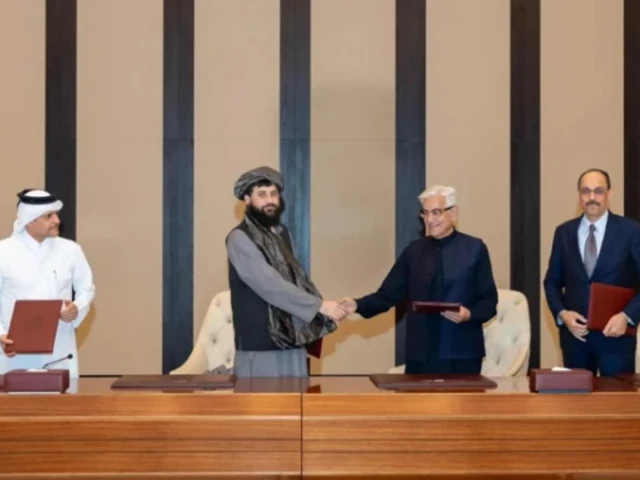Pakistan and Afghanistan agreed to an immediate ceasefire during talks in Doha, both sides said on Sunday, after a week of fierce border clashes, the worst violence between the South Asian neighbors since the Taliban seized power in Kabul in 2021.
The ceasefire “has been concluded”, Pakistan’s Defense Minister Khawaja Muhammad Asif wrote on X Sunday, saying both sides would meet again on October 25 in Istanbul to discuss “detailed issues”.
Pakistani delegation, led by Khawaja Asif, including other senior officials. On the Afghan side, the talks were led by Acting Defense Minister Mullah Yaqoob, accompanied by other representatives.
Pakistani officials raised the issue of cross-border terrorist attacks originating in Afghanistan, pointing in particular to groups such as the Gul Bahadur faction and the Tehreek-e-Taliban Pakistan (TTP). Islamabad maintains that these groups have been involved in several deadly incidents in Pakistan in recent months.
Sources familiar with the talks said Pakistan presented a ‘single point agenda’ focusing on dismantling terror networks. “Pakistan has made it clear that the Afghan government must eliminate terrorist organizations and their hideouts,” sources said.
Taliban spokesman Zabihullah Mujahid said in a statement that the parties had agreed to a full and meaningful ceasefire.
Read: Pakistan pressures Afghanistan to remove terror sanctuaries during Doha talks
Qatar’s foreign ministry, which brokered Saturday’s talks alongside Turkey, said the follow-up meetings were meant “to ensure the durability of the ceasefire and verify its implementation in a reliable and sustainable manner”.
Militant attacks and airstrikes
Pakistan and Afghanistan are searching for a way forward after the clashes killed dozens and injured hundreds. The talks were led by Asif and his Afghan counterpart, Mullah Muhammad Yaqoob, both sides said.
The ground battles between the former allies and Pakistani airstrikes across their disputed 2,600 km (1,600 mile) border were sparked after Islamabad demanded that Kabul rein in militants who had stepped up attacks in Pakistan, saying they were operating from sanctuaries in Afghanistan.
The Taliban refuse to give sanctuary to militants to attack Pakistan and accuse the Pakistani military of spreading misinformation about Afghanistan and sheltering militants linked to Islamic State to undermine its stability and sovereignty. Islamabad denies the allegations.
Militants have waged a war against the Pakistani state for years in an attempt to topple the government and replace it with their strict brand of Islamic governance.
On Friday, a suicide attack near the border killed seven Pakistani soldiers and wounded 13, security officials said.
“The Afghan regime must rein in the proxies who have sanctuaries in Afghanistan and use Afghan soil to carry out heinous attacks inside Pakistan,” Pakistan’s army chief, Field Marshal Asim Munir, said Saturday, addressing a graduation ceremony for cadets.
Read more: Over 200 Afghan troops were killed
The Taliban spokesman said that at the Doha talks, “it was decided that neither country will take hostile action against the other, and no support will be given to groups operating against the government of Pakistan.”
Tensions escalated after unprovoked firing by the Afghan Taliban regime
Tensions along the Pak-Afghan border escalated last week as clashes erupted after Afghan Taliban regime opened unprovoked fire at several locations in Khyber-Pakhtunkhwa (KP) and Balochistan, prompting a swift and forceful response by the Pakistan Army, which destroyed several Afghan posts and killed dozens of de-militants.
The coordinated attack originated from several key sectors including Angoor Adda, Bajaur, Kurram, Dir, Chitral in Khyber-Pakhtunkhwa and Baramcha in Balochistan. The firing, security sources said, was aimed at facilitating the illegal entry of Khwarij – the state-designated name for the outlawed Tehreek-i-Taliban Pakistan (TTP) – into Pakistani territory.
“The Pakistan Army responded immediately and decisively,” security sources said. “The counteroffensive effectively targeted and destroyed several Afghan positions on the border. Dozens of Afghan soldiers and Khwarij were killed in retaliatory fire”.



